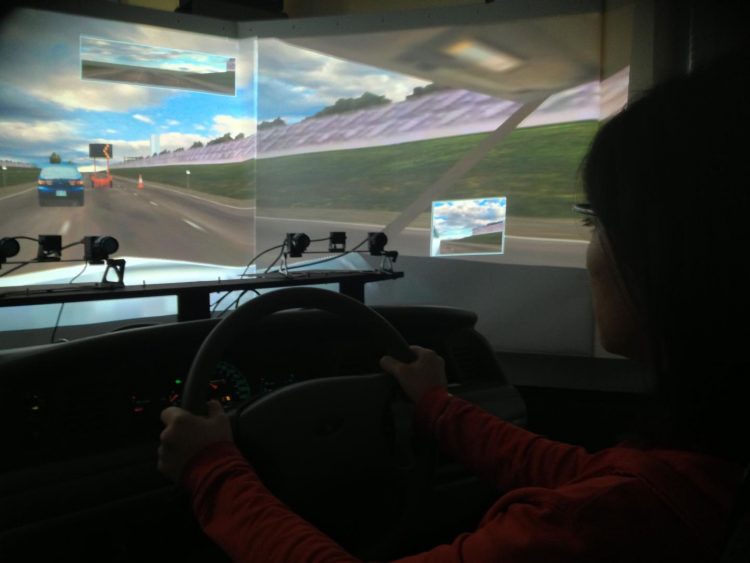Drivers, don't trade in your smartphone for Google Glass yet

Texting while driving with Google Glass is clearly a distraction, a new University of Central Florida study has concluded -- but there is a twist. In the study, texting Glass users outperformed smartphone users when regaining control of their vehicles after a traffic incident. Credit: University of Central Florida
“Texting with either a smartphone or Glass will cause distraction and should be avoided while driving” said UCF researcher Ben Sawyer. “Glass did help drivers in our study recover more quickly than those texting on a smartphone. We hope that Glass points the way to technology that can help deliver information with minimal risk.”
The study is the first scientific look at using Google Glass to text while driving.
Distracted drivers are a menace on the road, and according to the National Safety Council cell-phone use leads to at least 1.6 million crashes each year. With the emergence of Glass and competitors, several states are considering banning drivers from wearing those technologies.
“As distractive influences threaten to become more common and numerous in drivers' lives, we find the limited benefits provided by Glass a hopeful sign of technological solutions to come,” Sawyer added.
Sawyer, who has been studying distractions and how they impact human-machine interactions for years, conducted the study at UCF's MIT2 Laboratory. His expertise – Experimental Psychology, Industrial Engineering and Human Factors – gives him a unique perspective on new technology and how it is used.
Sawyer and his team set up the experiment with 40 twentysomethings. Each drove in a car simulator with either Glass or a smartphone and was forced to react to a vehicle ahead slamming on its brakes. Researchers compared text-messaging participants' reactions on each device to times when they were just driving without multitasking. Those using Glass were no better at hitting their brakes in time, but after their close call returned to driving normally more quickly.
“While Glass-using drivers demonstrated some areas of improved performance in recovering from the brake event, the device did not improve their response to the event itself,” Sawyer said. “More importantly, for every measure we recorded, messaging with either device negatively impacted driving performance. Compared to those just driving, multitaskers reacted more slowly, preserved less headway during the brake event, and subsequently adopted greater following distances.”
While Glass gives drivers the option of using head movements and voice commands to view and respond to text messages, avoiding clumsy thumbs, texting with the technology still causes distraction.
Bottom line: don't trade your smartphone in for Google Glass because you think it will make texting safer behind the wheel. It won't, at least not for now.
This research was completed in cooperation with UCF researcher and Professor Peter Hancock, Air Force Research Laboratory Research Psychologist Victor Finomore and Air Force Research Laboratory Engineer Andres Calvo. An article about the study will appear in an upcoming issue of the journal Human Factors.
Sawyer holds multiple degrees in Psychology and Industrial Engineering. He expects to earn his Ph.D. in experimental psychology from UCF In 2015. The Montana native has won multiple awards for both his design work as an engineer and his research in attention and usability as a psychologist. He is a two-time Repperger Scholar with the Air Force Research Laboratory (AFRL), having worked with the 711th Human Performance Wing in both their Battlefield Acoustics and Applied Neuroscience divisions. He works with his adviser Peter Hancock as the laboratory manager for the MIT2 Laboratory, and holds positions with The Department of Industrial Engineering, The Institute for Simulation & Training (IST), and AFRL.
Media Contact
More Information:
http://www.ucf.eduAll latest news from the category: Information Technology
Here you can find a summary of innovations in the fields of information and data processing and up-to-date developments on IT equipment and hardware.
This area covers topics such as IT services, IT architectures, IT management and telecommunications.
Newest articles

Properties of new materials for microchips
… can now be measured well. Reseachers of Delft University of Technology demonstrated measuring performance properties of ultrathin silicon membranes. Making ever smaller and more powerful chips requires new ultrathin…

Floating solar’s potential
… to support sustainable development by addressing climate, water, and energy goals holistically. A new study published this week in Nature Energy raises the potential for floating solar photovoltaics (FPV)…

Skyrmions move at record speeds
… a step towards the computing of the future. An international research team led by scientists from the CNRS1 has discovered that the magnetic nanobubbles2 known as skyrmions can be…





















